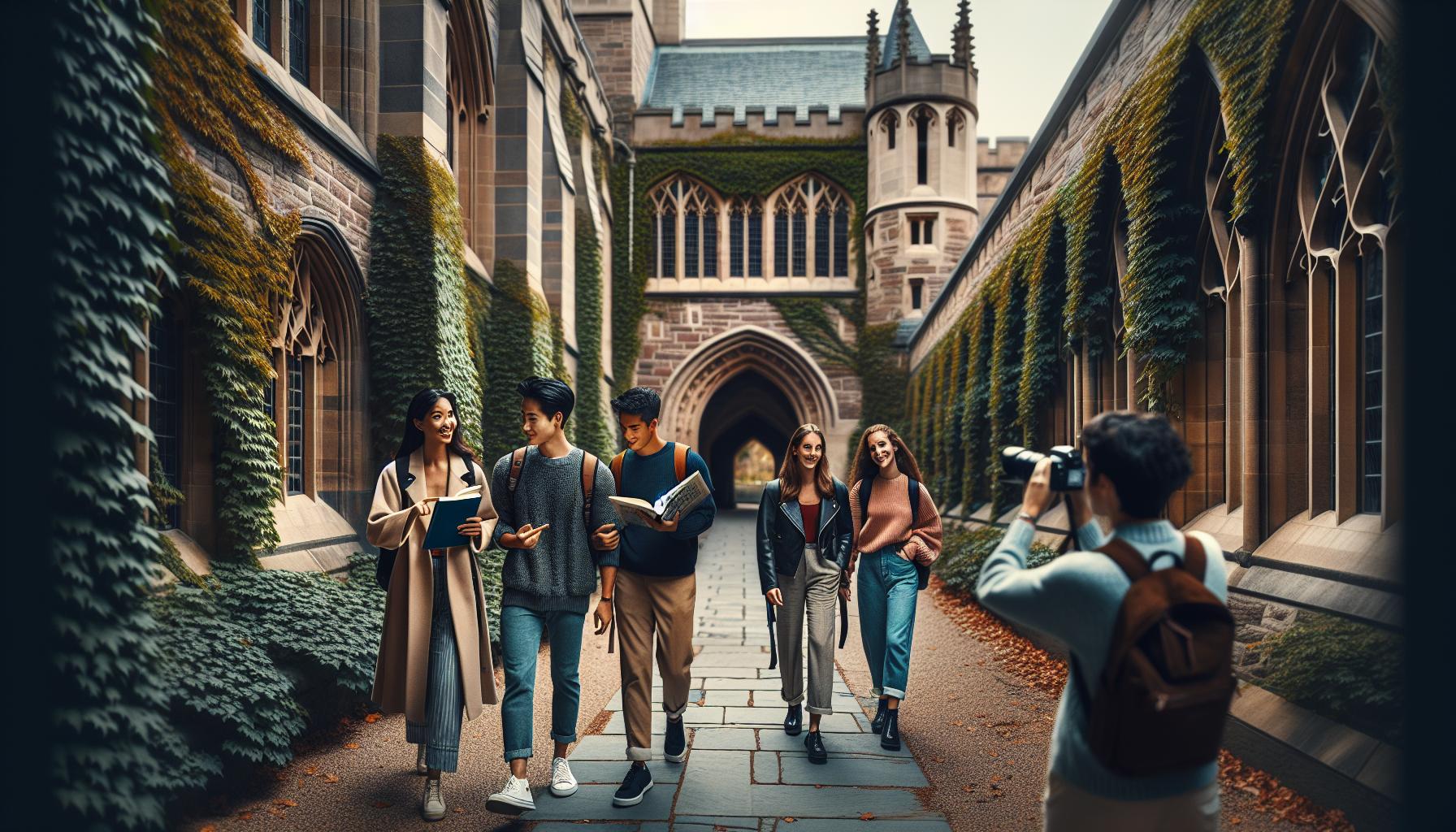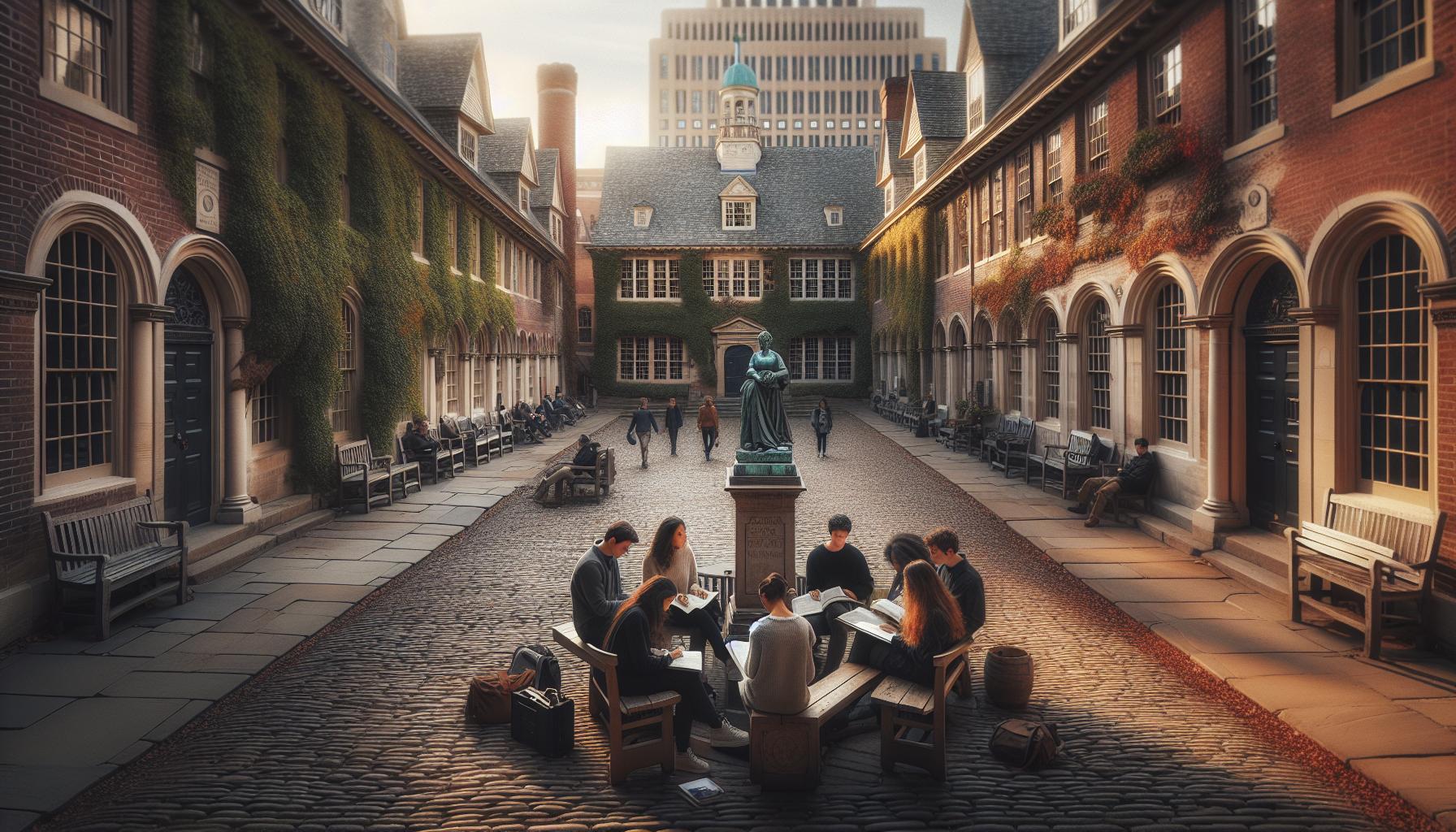Nestled in the vibrant city of New Haven, Connecticut, Yale University stands as a beacon of academic excellence and cultural richness. Known for its historic campuses and innovative research, Yale attracts students from around the globe, eager to immerse themselves in its diverse offerings. Understanding its location is essential for anyone considering a visit or applying to this prestigious institution. New Haven delights with a fusion of international cuisines, making it not only a center for education but also a culinary destination. This guide will navigate you through Yale’s geographical context, uncovering the unique character of both the university and its surrounding community. Whether you’re a prospective student, a curious traveler, or simply looking to learn more, keep reading to discover what makes Yale and New Haven truly special.
Where is Yale University Located?
Nestled in the vibrant city of New Haven, Connecticut, Yale University stands as a prominent landmark of academic excellence and historical significance. Known for its prestigious Ivy League status and rich tradition, Yale occupies a sprawling campus that encompasses 1,015 acres, blending architectural elegance with innovative facilities. The university’s coordinates are approximately 41°18′59″N latitude and 72°55′20″W longitude, making it a central feature of the New Haven community.
Yale’s campus is not only easily accessible but strategically located in a region that seamlessly connects students to the cultural and historical richness of Connecticut. The nearby downtown area is filled with restaurants, shops, and galleries, providing plenty of opportunities for students to explore and engage with the local community. The close proximity to public transportation options, including trains and buses, enhances travel convenience, making it simple for students to navigate both the campus and the surrounding areas.
As a student at Yale, you’ll find both the campus and the city offer a unique blend of resources and support. The university’s comprehensive libraries, research centers, and community organizations create an enriching environment conducive to learning and growth. New Haven’s involvement in Yale’s history, coupled with its evolving student-friendly atmosphere, serves as an ideal backdrop for college life. Whether you are seeking academic resources or looking to immerse yourself in local culture, Yale University’s location provides the perfect balance for a rewarding educational experience.
Exploring Yale’s Campus in New Haven

Located in the heart of New Haven, Connecticut, Yale University’s expansive campus creates an inviting environment that is both academically enriching and culturally vibrant. As you explore Yale, you can immerse yourself in a unique blend of historic architecture and state-of-the-art facilities. With over 300 years of history, each building and courtyard has a story to tell, making every step a new discovery. Numerous green spaces and meticulously maintained gardens provide perfect spots for relaxation and study among the student body.
Yale’s campus features distinct areas, such as the iconic Old Campus, which houses many undergraduate residences and the Yale College Dean’s Office. Don’t miss the Sterling Memorial Library, a stunning Gothic structure that serves as a central hub for research and study. Add in the Yale University Art Gallery, which showcases an impressive collection from ancient to contemporary art, and the British Art Center, and you have rich cultural experiences right at your fingertips. The layout promotes a pedestrian-friendly atmosphere, encouraging students to wander freely while engaging in spontaneous study groups or social gatherings.
The dynamic environment of New Haven further enhances the Yale experience. Students benefit from a plethora of coffee shops, restaurants, and diverse cultural venues that lie just steps away from campus. Whether you grab a slice from a local pizzeria or explore art galleries downtown, there’s always something new to engage with. Opportunities for student involvement abound, from participating in local community service to attending performances and lectures that enrich both personal and academic growth.
For those looking to balance studying with leisure, Yale’s campus and surrounding New Haven offer ample resources and support networks-vital for tackling the challenges of academic life. From tutoring centers to vibrant student organizations, students are never far from the help and community they need to thrive during their time at Yale. Engaging with the local area helps form connections and fosters a sense of belonging that extends well beyond the classroom.
Historical Significance of Yale’s Location

The location of Yale University in New Haven, Connecticut, is steeped in history and significance that extends well beyond its established campus. Founded in 1701, Yale was originally located in Saybrook, but it moved to New Haven in 1716, a strategic decision that shaped its future. The choice of New Haven as its home was influenced by its position as a thriving coastal city and bustling hub of trade. This location allowed Yale to attract not only students and faculty but also notable thinkers, politicians, and philanthropists throughout American history.
New Haven’s rich history as a meeting point of various cultures and ideas parallels Yale’s educational mission of fostering innovation and inquiry. The city’s role as an early center of commerce and learning provided a conducive environment for Yale’s growth. Many of the founding figures of the university were deeply connected to the city, and this symbiotic relationship laid the groundwork for a vibrant academic community. Throughout the years, Yale has also contributed to the cultural landscape of New Haven, influencing everything from architecture to local governance.
As you navigate Yale’s campus today, you’ll encounter buildings that reflect centuries of architectural evolution, echoing the stories of those who walked the grounds before you. Iconic structures, such as the Sterling Memorial Library and the Yale University Art Gallery, embody a blend of historical significance and modern innovation. Each brick and courtyard evokes a sense of legacy, sparking connections between the university’s past and present.
Living in New Haven provides students with an enriching experience that complements their academic pursuits. The proximity to a city rich in history, arts, and community engagement allows for a unique blend of study and exploration. Engaging with local landmarks, historical sites, and cultural events deepens the understanding of their education and the broader societal context. This interaction not only enhances personal growth but also fosters a sense of belonging, making Yale much more than a place of learning; it is a pivotal part of a larger historical narrative that shapes both Yale and New Haven.
Transportation Options to Yale University
Getting to Yale University is straightforward, thanks to a variety of transportation options that cater to both local and international students. Nestled in New Haven, Connecticut, the university is well-connected, making it accessible from nearby cities and beyond. Whether you plan to arrive by car, train, bus, or air, there are ample opportunities to find the most convenient route to campus.
For those traveling by train, the Metro-North Railroad provides service from New York City, along with Amtrak for longer journeys from other states. The New Haven Union Station is approximately a 10-minute ride from campus by public transportation or taxi. Transit options from the station include local buses and shuttles or the Yale shuttle service that caters specifically to students and staff, ensuring seamless connectivity to various parts of the university.
If you prefer to drive, Yale is easily accessible from major highways like I-95 and I-91. On-campus parking is available, but it’s advisable to familiarize yourself with the specific parking regulations and availability, especially during busy academic sessions. For environmentally conscious students, biking is also an increasingly popular option, with bike lanes and racks conveniently placed throughout campus.
Finally, for international students flying into the area, Tweed New Haven Airport offers regional flights, while Bradley International Airport, about an hour away, serves larger flights. Shuttle services or car rentals from both airports can help you reach Yale with ease. No matter how you choose to travel, getting to Yale is manageable, allowing you to focus on your studies and campus life.
Nearby Attractions and Landmarks to Visit

New Haven, Connecticut, is a vibrant city that offers an array of attractions and landmarks, making it an exciting place for students and visitors alike. Whether you’re a history buff, an art enthusiast, or a foodie, there’s something for everyone just a stone’s throw away from Yale’s campus.
Among the culinary treasures, don’t miss grabbing a slice at Frank Pepe Pizzeria Napoletana, renowned for its coal-fired, thin-crust pizzas that have been delighting locals and visitors for decades. Another must-visit is Louis’ Lunch, often credited with inventing the hamburger, which serves its iconic burgers on toast. For those who appreciate the arts, the Yale University Art Gallery and the Yale Center for British Art house impressive collections spanning various periods and styles, and they are free to the public, making them a perfect study break destination.
If you’re interested in the outdoors, East Rock Park offers stunning views of the city and the Long Island Sound, perfect for a hike or a picnic with friends. The park’s prominent rock formation provides an excellent vantage point and is a favorite spot for students looking to unwind. Additionally, the historic New Haven Green serves as a central hub, surrounded by charming cafes, shops, and local events throughout the year, fostering a strong sense of community.
For those intrigued by history, a visit to The New Haven Museum can provide insights into the city’s rich past. The museum frequently showcases exhibits on local history, from the Revolutionary War to contemporary culture. Finally, don’t forget to explore the unique shops and boutiques in the Nate Smith Business District, where you can find anything from vintage clothing to artisanal goods, perfect for those wanting to experience the local scene authentically.
Embracing these diverse attractions can enrich your experience while studying or visiting Yale, providing a perfect balance of academic rigor and leisure in New Haven.
Living in New Haven: Student Life Overview
New Haven is more than just the home of Yale University; it’s a vibrant city bursting with life, culture, and opportunities that enrich the student experience. As a Yale student, you’ll find yourself immersed in a supportive community with diverse activities, resources, and a dynamic social scene. From academic life to leisure activities, New Haven provides a well-rounded environment for both personal growth and educational success.
One of the biggest draws for students is the eclectic mix of cultural experiences available. New Haven boasts a variety of restaurants and cafes where you can savor delicious local cuisine, including the much-acclaimed New Haven-style pizza. Beyond the culinary scene, the city is alive with arts and culture, featuring venues like the Shubert Theater and numerous galleries, including the Yale University Art Gallery, where students can enjoy free entry. Community events, live music, and festivals frequently populate the local calendar, making it easy to engage with fellow students and residents.
Navigating student life also includes finding the right balance between academic rigor and relaxation. Many students benefit from joining clubs and organizations that match their interests, from cultural groups to academic societies. These groups not only foster a sense of belonging but also provide opportunities for networking and personal development. Living in dorms or nearby off-campus housing offers a chance to build lifelong friendships and creates a supportive living environment that allows for collaboration and study groups.
Additionally, making connections within the city can be as simple as exploring New Haven’s beautiful outdoor spaces. Parks like East Rock and Lighthouse Point provide a perfect backdrop for study breaks or weekend hikes, with breathtaking views that help students unwind and recharge. Engaging with the local community can also expand your horizons through volunteer opportunities or internships, further enhancing your overall educational journey.
To succeed, remember to utilize available resources, including academic advising, mental health services, and career workshops aimed at both domestic and international students. By leveraging these supports, you’ll navigate the challenges of college life more effectively, ensuring that your time at Yale-and in New Haven-is as enriching and fulfilling as possible.
Housing Options for Yale Students
Yale University offers a variety of housing options that cater to different needs, lifestyles, and budgets. Understanding these choices can greatly enhance your college experience, providing you with the comfort and community essential for academic success. Many first-year students live in residential colleges, which are not just about housing but also create vibrant communities where students can forge lifelong friendships and connect academically. Each of Yale’s twelve residential colleges has its unique character, providing a range of amenities, dining options, and support services.
On-Campus Housing
For those wishing to immerse themselves in Yale’s rich culture and community, on-campus living is a convenient and popular choice. The residential colleges facilitate a seamless blend of social and academic life. Each college features dormitories with room configurations ranging from singles to suites, fostering a sense of belonging and providing easy access to campus resources, libraries, and study spaces. Students also benefit from designated faculty fellows who live in the colleges, offering mentorship and guidance.
- Room Types: Choices include singles, doubles, and shared suites.
- Dining: Meal plans provide access to a variety of dining facilities and cater to diverse dietary preferences.
- Community Activities: Each college hosts events, lectures, and social gatherings that enrich student life.
Off-Campus Housing
For upperclassmen and those craving a bit more independence, off-campus housing presents an attractive alternative. New Haven has a range of apartment options nearby, including modern complexes and historical homes, much sought after for their proximity to the university. This arrangement allows students to explore the city’s vibrant culture, with easy access to local businesses, cafes, and parks.
When searching for off-campus options, consider these factors:
- Budget: Compare rental costs and utilities to find something that aligns with your financial plan.
- Location: Prioritize safety and proximity to campus, especially if you will be taking evening classes.
- Roommates: Living with peers can mitigate costs while enhancing your social experience.
Resources and Support
Yale provides extensive support for students navigating their housing options. The Housing Office can assist with both on-campus assignments and off-campus searches, providing resources such as listings and rental advice. Furthermore, connecting with fellow students via social media groups and campus organizations can lead to finding roommates or subleases, creating a network of support as you settle in.
By understanding the various housing options available at Yale and leveraging the resources provided, students can make informed decisions that will support their academic, social, and personal development throughout their time at the university.
Understanding Yale’s Campus Layout
Yale University’s campus is a stunning amalgamation of Gothic architecture, modern facilities, and green spaces, sprawling across 345 acres in the heart of New Haven, Connecticut. Students quickly find that navigating this historic and vibrant space can be both exciting and sometimes overwhelming. Recognizing key landmarks and understanding the campus layout can significantly enhance daily experiences, from attending classes to exploring extracurricular activities.
The main campus is divided into several distinct sections, each housing various departments and resources, such as libraries, laboratories, and residential colleges. The Yale College residential colleges, each with their unique designs and themes, are strategically positioned to foster community and facilitate easy access to academic resources. For instance, the iconic Sterling Memorial Library, with its magnificent stained glass windows, serves as an essential hub for research and study. Additionally, the nearby Yale Art Gallery and Yale Center for British Art offer enriching experiences that blend education with creativity.
To help students navigate this expansive campus, the following tips can be beneficial:
- Familiarize Yourself with Campus Maps: Yale provides detailed maps both online and in print. Taking the time to explore these resources will help you identify important locations.
- Attend Orientation Tours: Participating in campus tours during orientation can provide insights that maps alone cannot, such as shortcuts and truly hidden gems.
- Use Campus Technology: Yale’s mobile app includes a map feature to help you find your way and discover events happening on campus.
- Connect with Peers: Engaging with other students can lead to discovering useful tips and shortcuts, enriching your campus experience.
As you settle into your academic journey at Yale, remember that the layout isn’t just about navigating buildings; it also reflects the university’s commitment to creating a dynamic and engaging educational environment. Explore the charms of new spaces, join study groups in lively areas, and participate in events that highlight the community spirit of Yale. By embracing this vibrant campus landscape, you’ll find plenty of opportunities to learn, grow, and thrive during your time at the university.
Connecticut’s Role in Yale University’s Prestige
Connecticut’s rich history and educational landscape significantly contribute to Yale University’s prestige. As one of the oldest institutions of higher learning in the United States, Yale stands as a prominent symbol of academic excellence, deeply intertwined with the culture and heritage of its home state. Established in 1701, Yale not only reflects the intellectual spirit of its locality but also enhances Connecticut’s reputation as a hub for higher education.
Connecticut has long been known for its commitment to education, with several other respected universities and colleges that create an atmosphere of scholarly achievement. This environment fosters collaboration among institutions, encouraging student engagement in various research initiatives, academic partnerships, and community programs. Moreover, Yale’s influence often extends beyond academia into Connecticut’s cultural and economic spheres, drawing visitors and prospective students to the state while promoting local businesses.
Residents of New Haven and the broader Connecticut region benefit from the university’s innovative programs and events, which connect students and the community through lectures, art exhibitions, and performances. The vibrant arts scene surrounding Yale, including renowned institutions like the Yale Art Gallery and the Yale Center for British Art, showcases the university’s role in enhancing local cultural life. This interaction enriches the student experience while embedding Yale deeper into the heart of Connecticut life.
In terms of transportation, Connecticut’s extensive public transport system, including trains and buses, ensures ease of access to and from Yale, allowing students to explore both local and regional attractions effectively. This accessibility not only helps students navigate their academic journeys but also empowers them to engage with the state’s rich historical landmarks, such as the Mark Twain House and the Harriet Beecher Stowe Center, thereby broadening their educational experience.
Ultimately, is multifaceted, encompassing academic, cultural, and community dimensions that collectively enhance the student experience and solidify the university’s standing as a leading institution in the United States and beyond.
Insight into Yale’s Neighborhood Community
Nestled in the heart of New Haven, Yale University is not just an academic institution; it’s an integral part of a vibrant community that thrives on diversity, creativity, and engagement. The neighborhood surrounding Yale is rich with history and culture, making it a captivating place for students to explore both academically and personally. Living in this lively environment provides students with unique opportunities to connect with local residents, participate in community events, and immerse themselves in the myriad of cultural experiences that New Haven has to offer.
Yale’s location in New Haven provides students with easy access to a myriad of local resources and attractions. From quaint coffee shops and farm-to-table restaurants to bustling markets and art galleries, the neighborhood is filled with options that cater to varying tastes and interests. The famed local cuisine, particularly the renowned New Haven-style pizza, is a must-try for every student. Engaging with local businesses not only enriches the student experience but also fosters strong community ties, encouraging students to become active participants in the city’s economic and cultural life.
In addition to cultural amenities, the neighborhood is home to a host of organizations and initiatives designed to support students. Local community centers often offer programs and workshops, ranging from language classes to professional development seminars. These opportunities enable students to enhance their skill sets while building connections outside of the university setting. Furthermore, the city frequently hosts events, such as street festivals and art exhibitions, that invite student involvement and celebrate the community’s collective creativity.
It’s crucial for students to familiarize themselves with the local infrastructure to make the most of their time at Yale. Public transportation options, including buses and trains, connect New Haven to Connecticut and beyond, making it possible for students to explore nearby towns and attractions with ease. The friendliness of the local residents often creates a welcoming environment for newcomers, making it easier for students to form friendships and get involved in neighborhood activities. Embracing this community spirit not only enhances their college experience but also contributes to their personal and professional growth as they navigate life at Yale and prepare for future endeavors.
Helpful Resources for Prospective Students
Finding resources as a prospective student can greatly ease the transition to life at Yale University and New Haven. The university offers a wealth of tools tailored to assist you in navigating everything from admissions to daily student life. Given Yale’s extensive academic environment and community spirit, leveraging these resources can help you thrive both academically and personally.
Begin with the Yale Admissions Office. Their website is filled with up-to-date information on the application process, requirements, and important deadlines. For international students, there are specific resources regarding visa applications and student support services, ensuring you understand what’s necessary to study in the U.S. You can also connect with admissions counselors through virtual information sessions or personal inquiries, which can provide tailored guidance based on your individual circumstances.
Next, familiarize yourself with financial aid options. Yale has a robust financial aid program designed to meet 100% of demonstrated financial need for all admitted students. The financial aid office provides detailed instructions on applying for scholarships, loans, and managing student budgets. For those worried about college financing, utilizing Yale’s financial calculators may help provide a clearer picture of costs and aid packages, allowing you to plan effectively.
Additionally, don’t overlook local resources in New Haven. The city has a vibrant community with various organizations that provide workshops, tutoring, and professional development opportunities. Familiarizing yourself with these can enhance your educational experience, offering practical skills and networking possibilities. Look into Yale’s partnerships with local businesses, which may lead to internships or jobs that can complement your studies.
Finally, join student organizations early on. Whether focused on cultural clubs, academic interests, or social causes, these groups not only enrich your time at Yale but also connect you with peers and mentors who can provide support and advice. Engaging with others in the Yale community can enhance your social circle while deepening your involvement in the local area.
By exploring these resources, you can set a solid foundation for a successful and enriching experience at Yale University, both academically and socially.
Navigating Yale’s Academic and Cultural Offerings
Navigating the intricate world of academia and culture at Yale University is an adventure filled with options that can enhance both your educational journey and personal growth. For students looking to immerse themselves in a diverse academic environment, Yale offers an extensive range of programs across various disciplines. Whether you’re interested in the humanities, sciences, or artistic endeavors, you’ll find an array of courses taught by leading experts in their fields. The university’s emphasis on interdisciplinary study encourages students to connect ideas across different domains, fostering a more holistic learning experience.
To make the most of your academic journey, participating in academic resources such as the Yale Writing Center and the Center for Teaching and Learning can be incredibly beneficial. These centers provide useful support, including writing assistance, study tips, and tutoring, which can be especially helpful during exam periods or when tackling challenging projects. It’s also valuable to make connections with faculty members; consider attending office hours or reaching out with questions. Faculty mentorship can lead to unique research opportunities and personalized academic advice.
Engaging with Cultural Opportunities
Yale’s commitment to cultural awareness and engagement further enriches the student experience. The university boasts numerous museums, galleries, and performance spaces, including the renowned Yale University Art Gallery and the Yale Repertory Theatre. Attending exhibits or performances not only broadens your aesthetic appreciation but also connects you with the community and fosters discussions around various cultural themes. Additionally, events such as the annual Yale Arts Festival provide a platform for students to showcase their creative talents, encouraging participation and collaboration among peers.
Moreover, don’t forget to explore student organizations that cater to various academic and cultural interests. With over 500 organizations on campus, there’s something for everyone-from cultural clubs celebrating diversity to academic groups that facilitate networking and knowledge-sharing. Getting involved in these groups can help you build a supportive network and deeply engage with the vibrant community at Yale.
By taking advantage of the academic resources and cultural offerings, students at Yale can cultivate a rich and rewarding experience that enhances their education and personal development. Embrace the opportunities available, and you’ll find that navigating Yale’s academic landscape can be both fulfilling and inspiring.
FAQ
Q: Where is Yale University located?
A: Yale University is located in New Haven, Connecticut. This historic city is known for its vibrant culture and academic atmosphere, making it an ideal setting for one of the nation’s prestigious Ivy League institutions.
Q: What are the main attractions near Yale University?
A: Near Yale University, you can explore attractions such as the Yale University Art Gallery, the Peabody Museum of Natural History, and the historic New Haven Green. These sites enhance the campus experience for students and visitors alike.
Q: What is the best way to get to Yale University?
A: The best way to reach Yale University is by car, public transportation, or train. The New Haven Union Station is conveniently located nearby, providing access through Metro-North and Amtrak services. For local travel, bus routes are also available.
Q: What is the climate like in New Haven?
A: New Haven experiences a humid continental climate, with cold winters and warm summers. Snowfall is common in winter, making it essential for students to prepare for varying seasonal conditions while attending Yale.
Q: Are there housing options available for Yale students?
A: Yes, Yale University offers various housing options for students, including residential colleges and off-campus apartments. Students should explore both on-campus and nearby housing to find accommodations that fit their needs.
Q: What is the historical significance of Yale’s location?
A: Yale’s location has historical significance as it was founded in 1701 and has been an integral part of New Haven’s development. The university has influenced the city’s culture, economy, and educational landscape over the centuries.
Q: What transportation options are available for getting around New Haven?
A: In New Haven, students can utilize public buses, bike-sharing programs, and ride-sharing services. Yale also offers shuttles and safe walking paths, making it easy to navigate the campus and surrounding areas.
Q: How does living in New Haven enhance the student experience at Yale?
A: Living in New Haven allows Yale students to engage with a diverse community and access rich cultural experiences, ranging from theater performances to culinary delights. This vibrant environment complements academic pursuits and fosters personal growth.
In Retrospect
As you explore the vibrant campus of Yale University, nestled in New Haven, Connecticut, remember that your journey to higher education can be both exciting and challenging. If you’re curious about student life or looking for tips on financial management and scholarships, check out our guides on visa applications and university admissions for more vital insights. Don’t hesitate to dive into our resource sections, where you’ll find expert advice tailored specifically for both domestic and international students.
Take the next step toward your academic future today! Subscribe to our newsletter for the latest updates and valuable tips to help you thrive on your educational journey. We invite you to explore more of our content on housing options and study techniques, ensuring you’re well-prepared as you embark on this incredible chapter at Yale. Your comments and questions are always welcome-let’s facilitate this conversation together!









